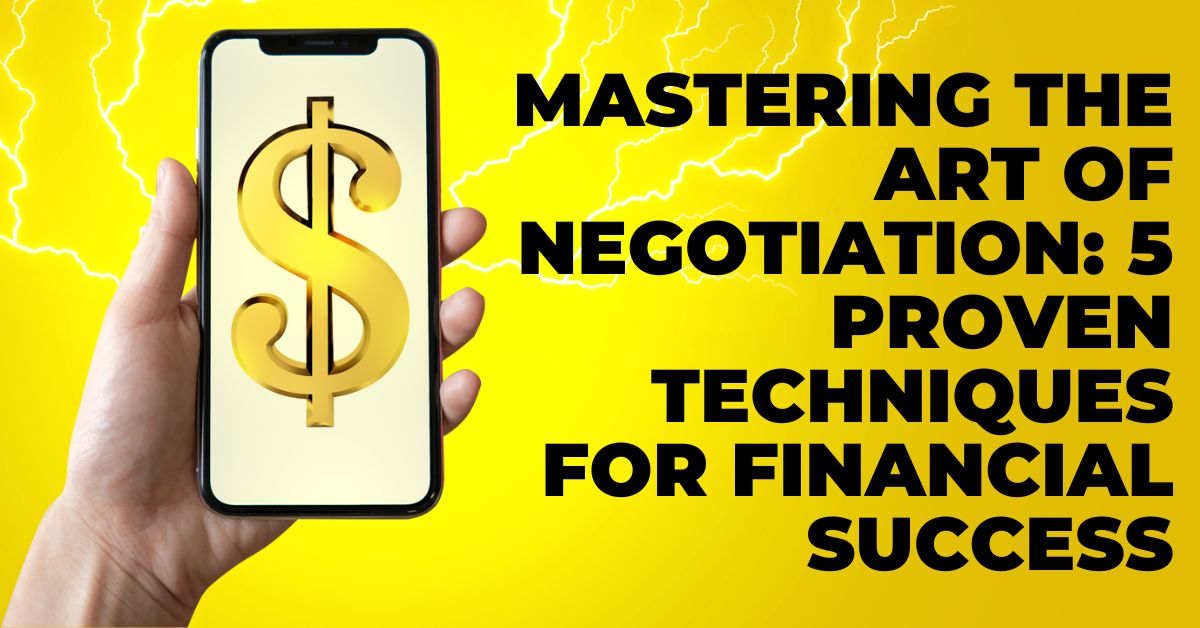Table of Contents:
- Introduction
- Understanding the Importance of Negotiation in Finance
- Technique 1: Preparation is Key
- Research Thoroughly
- Set Clear Objectives
- Technique 2: Effective Communication Skills
- Active Listening
- Assertiveness
- Empathy
- Technique 3: Creating Win-Win Solutions
- Identifying Mutual Interests
- Brainstorming Options
- Finding Common Ground
- Technique 4: Building Relationships
- Establishing Rapport
- Maintaining Professionalism
- Fostering Trust
- Technique 5: Knowing When to Walk Away
- Recognizing Deal Breakers
- Understanding Your BATNA
- Conclusion
1. Introduction
Negotiation is a fundamental skill in the world of finance. Whether you’re haggling over a salary, striking a deal with a client, or securing financing for a project, the ability to negotiate effectively can significantly impact your financial success. In this article, we’ll explore five proven techniques for mastering the art of negotiation and achieving your financial goals.
2. Understanding the Importance of Negotiation in Finance
Negotiation plays a crucial role in various financial transactions and scenarios. It can determine the profitability of a business deal, the terms of a contract, or the outcome of a dispute. By honing your negotiation skills, you can maximize value, minimize risks, and build stronger relationships with clients, partners, and stakeholders.
3. Technique 1: Preparation is Key
Before entering any negotiation, thorough preparation is essential. This involves researching the other party, understanding their needs and objectives, and clarifying your own goals. By having a clear understanding of the situation and potential outcomes, you’ll be better equipped to negotiate effectively.
Research Thoroughly: Gather information about the other party, their business, industry trends, and market conditions. This knowledge will give you insights into their priorities and concerns.
Set Clear Objectives: Define what you hope to achieve from the negotiation, whether it’s securing a better price, favorable terms, or a mutually beneficial agreement. Having specific goals will guide your strategy during the negotiation process.
4. Technique 2: Effective Communication Skills
Communication lies at the heart of negotiation. Developing strong communication skills can help you convey your message clearly, understand the other party’s perspective, and build rapport.
Active Listening: Pay close attention to what the other party is saying, and ask clarifying questions to ensure you understand their needs and concerns.
Assertiveness: Clearly express your own interests and priorities while remaining respectful and professional. Assertiveness can help you assert your position without being aggressive or confrontational.
Empathy: Put yourself in the other party’s shoes and try to understand their motivations and constraints. Showing empathy can build trust and facilitate problem-solving.
5. Technique 3: Creating Win-Win Solutions
The most successful negotiations result in outcomes that satisfy the interests of both parties. By focusing on creating win-win solutions, you can build stronger relationships and foster collaboration.
Identifying Mutual Interests: Look for common ground and shared objectives that can form the basis of a mutually beneficial agreement.
Brainstorming Options: Explore various possibilities and alternatives to find creative solutions that meet both parties’ needs.
Finding Common Ground: Emphasize areas of agreement and work together to overcome differences. By collaborating rather than competing, you can achieve better outcomes for everyone involved.
6. Technique 4: Building Relationships
Negotiation is not just about reaching a deal; it’s also about building long-term relationships. Investing time and effort into building rapport and trust can pay dividends in future negotiations.
Establishing Rapport: Build a rapport with the other party by finding common interests, engaging in small talk, and demonstrating sincerity.
Maintaining Professionalism: While building relationships is important, it’s essential to maintain professionalism and integrity throughout the negotiation process.
Fostering Trust: Be honest, transparent, and reliable in your dealings. Trust is the foundation of successful negotiations and long-lasting partnerships.
7. Technique 5: Knowing When to Walk Away
Sometimes, the best negotiation tactic is knowing when to walk away. By recognizing deal breakers and understanding your Best Alternative to a Negotiated Agreement (BATNA), you can avoid making unfavorable compromises and protect your interests.
Recognizing Deal Breakers: Identify non-negotiable factors that would make the deal unacceptable or unsustainable.
Understanding Your BATNA: Evaluate your alternatives and consider the consequences of not reaching an agreement. Knowing your BATNA can give you leverage and confidence during negotiations.
8. Conclusion
Mastering the art of negotiation is essential for achieving financial success in today’s competitive business environment. By following these five proven techniques—preparation, effective communication, creating win-win solutions, building relationships, and knowing when to walk away—you can enhance your negotiation skills and maximize value in all your financial dealings. Remember, negotiation is not just about reaching a deal; it’s about creating opportunities for mutual gain and building lasting partnerships.
